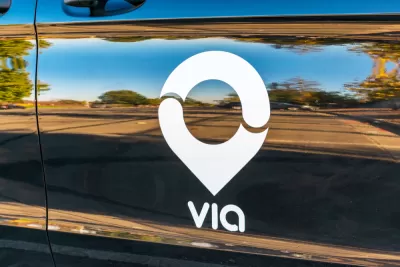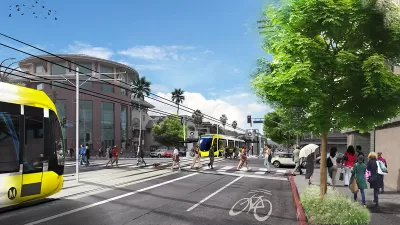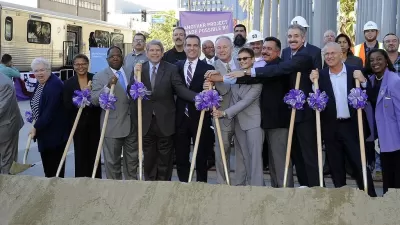Private companies and public transit agencies will share a lot of data to ensure that new mobility on demand (MOD) services are effective and sustainable. Lessons on the kinds of data necessary to make MOD work are emerging in L.A. and Seattle.

Alice Grossman and Paul Lewis share a new research paper on the subject of mobility on demand (MOD) case studies in the Los Angeles and Puget Sound regions, which are testing concepts on the way toward establishing MOD as a component of long-term service plans.
"This report examines the data needs that agency staff need to consider when developing a MOD agreement with private providers," according to the article that introduces the report. "Many MOD providers are relatively new private companies often referred to as transportation network companies (TNCs). Differing goals, organizational structures, requirements, and service types between public transit agencies and private MOD providers must be understood and addressed to provide useful, coordinated projects."
The case study provided by the Los Angeles and Puget Sound regions is made possible by a Federal Transit Administration program called the Mobility on Demand Sandbox Demonstration Program.
FULL STORY: DATA ON DEMAND: A CASE STUDY IN THE LOS ANGELES AND PUGET SOUND REGIONS

Planetizen Federal Action Tracker
A weekly monitor of how Trump’s orders and actions are impacting planners and planning in America.

Maui's Vacation Rental Debate Turns Ugly
Verbal attacks, misinformation campaigns and fistfights plague a high-stakes debate to convert thousands of vacation rentals into long-term housing.

San Francisco Suspends Traffic Calming Amidst Record Deaths
Citing “a challenging fiscal landscape,” the city will cease the program on the heels of 42 traffic deaths, including 24 pedestrians.

Amtrak Rolls Out New Orleans to Alabama “Mardi Gras” Train
The new service will operate morning and evening departures between Mobile and New Orleans.

The Subversive Car-Free Guide to Trump's Great American Road Trip
Car-free ways to access Chicagoland’s best tourist attractions.

San Antonio and Austin are Fusing Into one Massive Megaregion
The region spanning the two central Texas cities is growing fast, posing challenges for local infrastructure and water supplies.
Urban Design for Planners 1: Software Tools
This six-course series explores essential urban design concepts using open source software and equips planners with the tools they need to participate fully in the urban design process.
Planning for Universal Design
Learn the tools for implementing Universal Design in planning regulations.
Heyer Gruel & Associates PA
JM Goldson LLC
Custer County Colorado
City of Camden Redevelopment Agency
City of Astoria
Transportation Research & Education Center (TREC) at Portland State University
Jefferson Parish Government
Camden Redevelopment Agency
City of Claremont




























